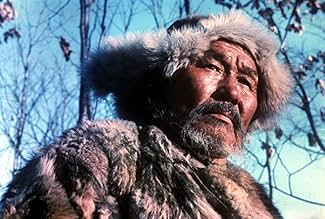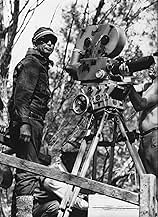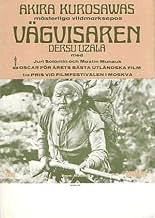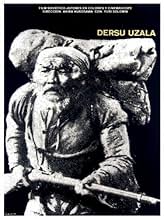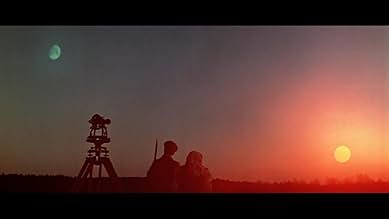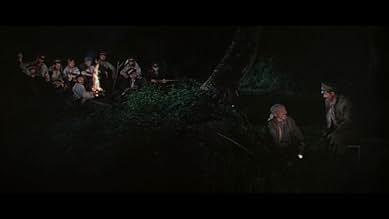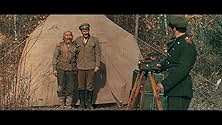CALIFICACIÓN DE IMDb
8.2/10
35 k
TU CALIFICACIÓN
El ejército ruso envía a un explorador en una expedición a la nevada estepa siberiana, donde se hace amigo de un experimentado cazador local.El ejército ruso envía a un explorador en una expedición a la nevada estepa siberiana, donde se hace amigo de un experimentado cazador local.El ejército ruso envía a un explorador en una expedición a la nevada estepa siberiana, donde se hace amigo de un experimentado cazador local.
- Dirección
- Guionistas
- Elenco
- Ganó 1 premio Óscar
- 8 premios ganados y 1 nominación en total
Mikhail Bychkov
- Otryad Arseneva
- (as M. Bychkov)
Vladimir Khrulyov
- Otryad Arseneva
- (as V. Khrulyov)
Stanislav Marin
- Otryad Arseneva
- (as S. Marin)
Igor Sykhra
- Otryad Arseneva
- (as I. Sykhra)
Vladimir Sergiyakov
- Otryad Arseneva
- (as V. Sergiyakov)
Yanis Yakobsons
- Otryad Arseneva
- (as Ya. Yakobsons)
Vladimir Khlestov
- Otryad Arseneva
- (as V. Khlestov)
Vladimir Sverba
- Otryad Arseneva
- (as V. Sverba)
Vladimir Kremena
- Turtygin
- (as V. Kremena)
Aleksandr Pyatkov
- Olenev
- (as A. Pyatkov)
- Dirección
- Guionistas
- Todo el elenco y el equipo
- Producción, taquilla y más en IMDbPro
Opiniones destacadas
Akira Kurosawa was a masterful director and powerful storyteller, Dersu has always been my favourite of his films. It was also the first I saw - on Christmas Day afternoon 1978 on UK BBC2 - would that they were as adventurous nowadays! Since then of course I've seen all of his films from Stray Dog on, Rashomon and Ran being especial favourites, but I keep on coming back to watch this one, ostensibly the simplest tale Kurosawa ever filmed.
The understanding and bonding that develops between the two men Arseniev and Dersu is wonderful to see, and over two hours holds your attention with expertly observed minutiae of character and scenic interplay. The last ten minutes cover a lot of ground (no pun intended) but it's all so logical and sad that I always need to see the end credits to recover.
So many marvellous scenes: the tiger in the forest in the morning; the phlegmatic reclusive old Chinaman; the raft; wispy blue shaded smoke from night-fires; the conclusion of course; the view of those two great men, the Moon and the Sun in the same shot. Not everyone would like Dersu, their most likely comments being "boring" - but how wrong they are they'll never know!
A film not fit to lick Dersu Uzala's metaphorical boots (or even Plan 9 from Outer Space's for that matter), Blazing Saddles was filmed the same year in America and a generation on still gets more praise than this poetic masterpiece!
The understanding and bonding that develops between the two men Arseniev and Dersu is wonderful to see, and over two hours holds your attention with expertly observed minutiae of character and scenic interplay. The last ten minutes cover a lot of ground (no pun intended) but it's all so logical and sad that I always need to see the end credits to recover.
So many marvellous scenes: the tiger in the forest in the morning; the phlegmatic reclusive old Chinaman; the raft; wispy blue shaded smoke from night-fires; the conclusion of course; the view of those two great men, the Moon and the Sun in the same shot. Not everyone would like Dersu, their most likely comments being "boring" - but how wrong they are they'll never know!
A film not fit to lick Dersu Uzala's metaphorical boots (or even Plan 9 from Outer Space's for that matter), Blazing Saddles was filmed the same year in America and a generation on still gets more praise than this poetic masterpiece!
This is one of my definite favorites.It tells a story of a man who is one with the wilderness and nature and cant live any other way.Dersu Uzala is an old Goldi(siberian asiatic minority) hunter who thinks he has been cursed after he kills a tiger.To him,every being,every part of the nature is equally worth as humans.
The film gives us accounts of one Russian captain's friendship with Dersu.They are together through thick and thin and Dersu even rescues him from a blizzard when they are stuck on a frozen lake.Dersu has all the natural senses and therefore knows when he is in danger.He knows everything by looking and observing the landscape around him.
So when he kills the tiger,its like a spell has been cast on him.Or is it just his imagination?His people believe in a ghost that rules the taiga,Kanga.He thinks Kanga will punish him in some way.Soon his fears start to get real.He cant kill his prey for food that he needs for living because his eyesight dramatically worsens.One frightening night(my favorite scene) it gets too much for him,listening to the howling wind in the dark,waiting for Kanga to send a tiger to kill him.And captain Arseniev,seeing the horror that struck him,offers him to come with him to his hometown.It happens so.
Throughout the film,you cant help but wonder what will happen to Dersu.Not only because in the beginning Arseniev searches for his grave,in retrospection,but also because he is one lonely,sad man who lives only by hunting.There is no place for him but the taiga.And when the tragedy happens,its hard not to feel remorse and pity the old Dersu.His world has come crashing down.The end specially is painful and shows that there is no mercy in this world for a man who falls from grace in his own homeground.
In the end,this film has outstanding photography,outstanding music,outstanding cast,beautiful scenery and do i need to say anything about the director? A timeless work that can never be surpassed.
The film gives us accounts of one Russian captain's friendship with Dersu.They are together through thick and thin and Dersu even rescues him from a blizzard when they are stuck on a frozen lake.Dersu has all the natural senses and therefore knows when he is in danger.He knows everything by looking and observing the landscape around him.
So when he kills the tiger,its like a spell has been cast on him.Or is it just his imagination?His people believe in a ghost that rules the taiga,Kanga.He thinks Kanga will punish him in some way.Soon his fears start to get real.He cant kill his prey for food that he needs for living because his eyesight dramatically worsens.One frightening night(my favorite scene) it gets too much for him,listening to the howling wind in the dark,waiting for Kanga to send a tiger to kill him.And captain Arseniev,seeing the horror that struck him,offers him to come with him to his hometown.It happens so.
Throughout the film,you cant help but wonder what will happen to Dersu.Not only because in the beginning Arseniev searches for his grave,in retrospection,but also because he is one lonely,sad man who lives only by hunting.There is no place for him but the taiga.And when the tragedy happens,its hard not to feel remorse and pity the old Dersu.His world has come crashing down.The end specially is painful and shows that there is no mercy in this world for a man who falls from grace in his own homeground.
In the end,this film has outstanding photography,outstanding music,outstanding cast,beautiful scenery and do i need to say anything about the director? A timeless work that can never be surpassed.
On the face of it, Dersu Uzala would not seem like a candidate for a great film. The story is about a young Russian (Imperial Russia) officer is sent to the far east of Siberia to explore. He meets with a native of the region and they form a bond together. The territory in question is the wild, rugged eastern Siberia (north of Valdivostok). I would say that you have not lived until you have seen what Kurosawa can do filming nature in its raw splendor and magnificence. The scenes in this film like the wind rushing through the tall reeds, or the mist draping the forested hills, are images of haunting beauty.
Kurosawa, one of the greatest film directors of the 20th century, made his final masterpiece with film. The characters are well drawn, the sub-text of the story (the clash of civilization vs. nature) is nuanced, but most of all it is the wild beauty of nature which is the focus of this film. Once you see it, I don't think you will forget it, I know I never have.
Kurosawa, one of the greatest film directors of the 20th century, made his final masterpiece with film. The characters are well drawn, the sub-text of the story (the clash of civilization vs. nature) is nuanced, but most of all it is the wild beauty of nature which is the focus of this film. Once you see it, I don't think you will forget it, I know I never have.
10hartj-1
A wonderful film. It showcases the natural beauty of the Taiga and presents a contrast between the technological and the pastoral. Dersu is one with the forest. He knows its ways and its moods. The Russians scoff at his ways and his 'primitive' belief system, but eventually come to rely on him, and even love him. It is a beautiful story that takes place in an world that very few of us in the West have had a chance to see. I thought the fact that the film was set in the pre-revolutionary period gave it a peculiar sort of charm - Russia before the Great War and the Russian Revolution was innocent and even naive, the same way the Russian soldiers were innocent of the wonders and the dangers of the Taiga. One of the things I loved most about this film was the cinematography - there are long, lingering shots of the landscape, the endless steppe, the forest, the rivers, the mountains. We believe ourselves to be powerful because we have been moderately successful in our attempts to harness nature for our own uses, but the film shows us that we are deluding ourselves, that nature cannot be controlled or resisted, and the truly powerful are those, like Dersu, who co-exist in harmony with nature and learn what the wilderness teaches.
I own many of Akira Kurosawa's films. I have Ran, Throne of blood, Seven Samarai, Roshomon, Dreams, Hidden Fortress, Jojimbo, Snajuro, Red Beard, and even "Kurosawa" the documentary. I guess you can say that I like his work. The "Kurosawa" documentary narrated by Sam Shepard and produced by thirteen / WNET I recommend for anyone at all interested in Kurosawa's films as it will really wet your appetite.
Of all of his films, Dersu Uzala is my favorite. It is also one of my favorite films by anybody. It was done shortly after Akira had went through a very dark time in his life and had attempted suicide. It was his first film afterwards and the content of the film appears to reflect more than a little of his mindset at the time. Dersu Uazla is both a feel good film and also a sad film. It touches the way that people as they grow older have a more and more difficult time adapting to life as it changes and has its affect on them. The end of the film can certainly show light on the inhumanity that appears to be growing more prevalent in our society. But, I think what you remember from the film is the love between two individuals, and that is what feels good.
Many of Kurosawa's films have a great deal of spectacle, and he is perhaps known best for his Samarai films. There is none of that in this movie. Dersu Uzala is a statement by Akira of life. Akira was fighting to keep making films and was not having an easy time of it. If Akira Kurosawa could not make films, he could not feel that he was living. As a result, he attempted suicide. He survived to make this film plus many others that we all enjoy today. Dersu Uzala may be the most important of his films and the one that shows the great director's true personality. Just perhaps, it shows more about humanity than any of his other films. Again, it is my favorite.
Of all of his films, Dersu Uzala is my favorite. It is also one of my favorite films by anybody. It was done shortly after Akira had went through a very dark time in his life and had attempted suicide. It was his first film afterwards and the content of the film appears to reflect more than a little of his mindset at the time. Dersu Uazla is both a feel good film and also a sad film. It touches the way that people as they grow older have a more and more difficult time adapting to life as it changes and has its affect on them. The end of the film can certainly show light on the inhumanity that appears to be growing more prevalent in our society. But, I think what you remember from the film is the love between two individuals, and that is what feels good.
Many of Kurosawa's films have a great deal of spectacle, and he is perhaps known best for his Samarai films. There is none of that in this movie. Dersu Uzala is a statement by Akira of life. Akira was fighting to keep making films and was not having an easy time of it. If Akira Kurosawa could not make films, he could not feel that he was living. As a result, he attempted suicide. He survived to make this film plus many others that we all enjoy today. Dersu Uzala may be the most important of his films and the one that shows the great director's true personality. Just perhaps, it shows more about humanity than any of his other films. Again, it is my favorite.
¿Sabías que…?
- TriviaAkira Kurosawa had hoped to make this film as early as in the 1950s, but he had trouble adapting the story to a Japanese setting, never thinking that one day he would actually be able to film it on location in Russia, and with Russian actors.
- ErroresWhen Dersu and Arsenev are looking at the 3/4 moon and the setting sun, the moon is in the wrong phase to appear in the sky at the same time as the sun.
- Citas
Dersu Uzala: How can people live in a box?
- ConexionesFeatured in For the Love of Movies: The Story of American Film Criticism (2009)
Selecciones populares
Inicia sesión para calificar y agrega a la lista de videos para obtener recomendaciones personalizadas
- How long is Dersu Uzala?Con tecnología de Alexa
Detalles
- Fecha de lanzamiento
- Países de origen
- Sitio oficial
- Idiomas
- También se conoce como
- Uzala, der Kirgise
- Locaciones de filmación
- Productoras
- Ver más créditos de la compañía en IMDbPro
Taquilla
- Presupuesto
- USD 4,000,000 (estimado)
- Total a nivel mundial
- USD 14,480
- Tiempo de ejecución2 horas 22 minutos
- Color
- Relación de aspecto
- 2.20 : 1
Contribuir a esta página
Sugiere una edición o agrega el contenido que falta


